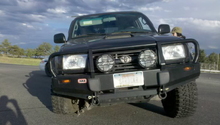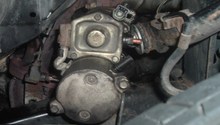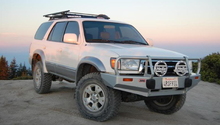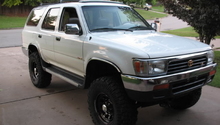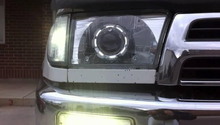Toyota 4Runner 1996-2002: Buying Guide
This buying guide offers key information about the Toyota 4Runner and further explains whether it would be a good buy for certain driving scenarios.
This article applies to the Toyota 4Runner (1996-2002).
The (1996-2002) Toyota 4Runner is a highly rated truck with maximum seating for five passengers, including the driver, an automatic transmission, an impressive V6 3.4-liter engine, and a sports utility body style for lasting off-roading capability. A reliable and dependable companion, the Toyota 4Runner can achieve hundreds of thousands of miles of travel; however, regular maintenance is strongly recommended for optimum performance and longevity.
4th Gen vs. 3rd Gen 4Runner
- Generally speaking, the 4th Gen 4Runner is thought to be more comfortable than the 3rd Gen model and with more options.
- The 4th Gen model carries a higher price tag than the 3rd, which some buyers will find of importance, and has noticeably less head space thanks to a shorter roof.
- The 3rd Gen 4Runner wins considerable points when it comes to ruggedness, however. It also offers a more reliable power train.
- Bottom line: The 3rd Gen Runner competes remarkably well against the 4th Gen model earning the most points for appearance, power and features.

What to Look for When Purchasing a 3rd Gen 4Runner
Before purchasing a 3rd Gen 4Runner be sure to thoroughly inspect the interior and exterior of the vehicle:
- check both the roof rack, exhaust system as well as the underbody of the vehicle for signs of corrosion (light to moderate corrosion may be correctable)
- rear suspension, which should contain tension and no sagging or corrosion in the spring coils
- ask about previous idle time and 4x4 use (driving patterns)
- check the play in the steering wheel
- check all options across the board, including working power windows and keyless entry
- take notice of the gear shifter when test driving the vehicle and note any excess movement (not an expensive fix, but bothersome, nonetheless)
- listen for any knocking sounds while driving
- test the brakes for consistence and smoothness as well as wear and leaks
- check for fluid leaks, air bubbles in the radiator, and oil in the anti-freeze
Finally, always be sure to check the vehicle's maintenance history, including emission testing, before signing on the dotted line. You don't want to inherit (or pay for) someone else's problems.

Additional Advice
When it comes to the 3rd Gen 4Runner, here's some advice you'll want to heed before signing on the dotted line:
- think twice about purchasing a 3rd Gen truck with a pre-installed lift; the truck might not be eligible for recall repairs to the rear suspension
- you can always swap out a bad engine or transmission for a re-manufactured one, if the truck is in otherwise good condition
- avoid trucks with an overall lack in power or poor shifting capability
- consider what type of driving you will be doing before buying a truck with a high number of mileage

Scheduled Maintenance
- The key to racking up hundreds of thousands of miles on your odometer is to replace your engine oil and filter every 5,000 miles, as well as replacing all your other fluids regularly.
- It's highly recommended that you have all your major systems inspected every 30,000 miles.
- Part of this inspection process should include having your spark plugs and wires replaced, checking your transfer case and mass air flow sensors for damage, and testing your timing belt.
Common Questions
How much mileage does the 4Runner achieve in the city and on the highway?
City is 15 MPG and highway is 18 MPG for a combined MPG of 18.
Is it safe to buy a used 4Runner with visible fluid leaks?
First thing's first: Identify the location of the leak and tighten any loose components, such as seals or belts, that might be contributing to it. Then, have the vehicle inspected by a certified mechanic. There could be a larger problem you are not skilled enough to diagnose or troubleshoot.
What transmission problems in the 4Runner should I never ignore?
See a certified mechanic if your transmission begins slipping or you experience difficulty when shifting into different gears. Any evidence of delayed engagement, fluid leaks or the presence of your transmission warning light are also problems you should never ignore.
Common Issues
Faulty Brake Pads
If your braking systems shows signs of degradation or poor performance, check your brake fluid and brake pads. Flushing your braking system as needed is also a good idea. A large issue could be connected to your radiator.
Transmission Issues
When it comes to transmission issues, the 4Runner is no different from any other truck (or vehicle for that matter). You will need to change your transmission fluid regularly and have your transmission systems inspected every 30,000 miles or as problems arise.
Related Discussions
- Generational Comparison - Yotatech.com
- Inspection Checklist - Yotatech.com


